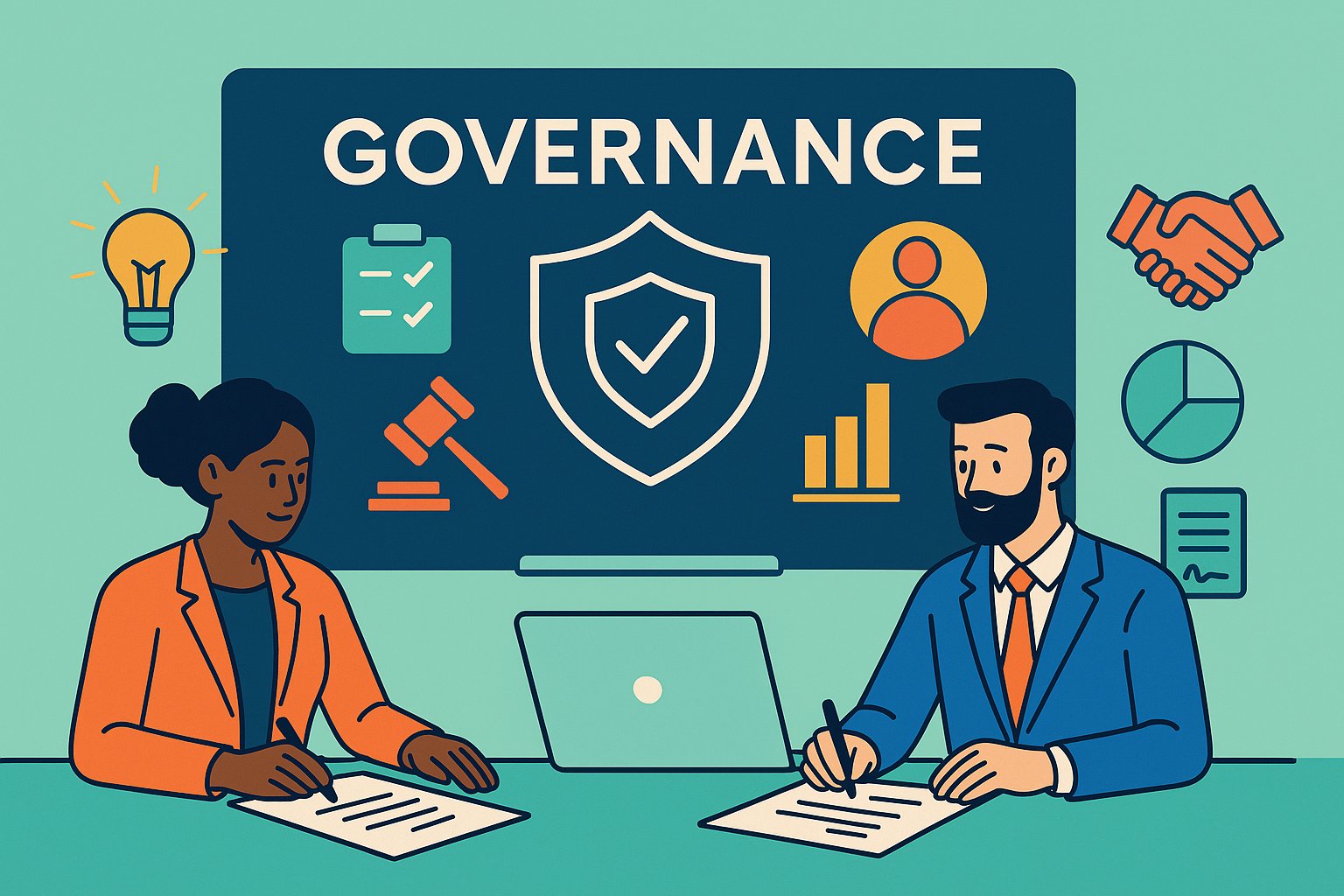Governance for Post-Funding Success
Raising capital marks a watershed moment in a startup’s journey—a validation of vision that fuels ambitious growth plans. Yet, the infusion of external funds also ushers in new responsibilities: founders must now pivot from lean, ad-hoc decision-making to a structured governance framework that balances agility with accountability. Effective governance is the backbone of sustainable success, ensuring that strategic choices are made transparently, fiduciary duties are honored, and stakeholder interests are harmonized. In this guide, we’ll explore the essential governance principles every founder should embrace once the boardroom doors open to investors, from composing a high-performing board and enacting robust policies to embedding risk management and transparency into your organizational DNA. By mastering governance early, you’ll not only satisfy legal and ethical obligations but also cultivate trust, attract future capital, and position your venture for enduring impact.
Understanding Corporate Governance: The Foundation of Trust
At its core, corporate governance refers to the systems, processes, and structures by which a company is directed and controlled. For founders accustomed to making—and pivoting on—rapid decisions, establishing governance may feel like an administrative hurdle. In reality, it represents a layer of trust-building that reassures investors, employees, and partners that the company is guided by clear rules and shared values. Governance frameworks typically cover board composition, decision-making protocols, conflict-of-interest rules, and performance oversight. By formalizing these elements, founders signal their commitment to transparency, reduce the likelihood of internal disputes, and create a resilient decision-making engine that scales as the company grows. Importantly, governance also codifies accountability: it delineates who has authority over critical areas like budget approvals, strategic pivots, and executive hiring, preventing power vacuums or unilateral actions that could jeopardize investor confidence.
Building Your Board: Allies and Advisors
A strong board of directors is the cornerstone of effective governance. Beyond representing legal requirements, a well-composed board brings strategic counsel, domain expertise, and networks that accelerate growth. Founders should strive for a balanced mix of independent and investor-nominated directors. Independent directors—often seasoned executives or industry veterans—offer unbiased perspectives and can chair committees such as audit or compensation, ensuring rigorous oversight. Investor-nominated seats reflect the company’s funding relationships, giving backers a voice in major decisions. When assembling your board, prioritize diversity of skills and backgrounds: combine financial acumen, operational leadership, and market knowledge. Early in your post-funding phase, draft a clear board charter that outlines roles, meeting cadence, quorum requirements, and board evaluation processes. Regular board retreats or strategy sessions can transform these meetings from mere compliance check-ins into catalysts for long-term planning and risk identification.
Structuring Roles and Responsibilities: Clarity at the Top
As your company scales, overlapping responsibilities can breed confusion and inefficiency. Governance demands that founders clearly define the duties and authorities of the board, the executive team, and management. The board’s primary focus should be on setting strategic direction, approving major investments, and evaluating CEO performance. Meanwhile, day-to-day execution—hiring, product development, sales operations—falls under the purview of the executive team. To cement this clarity, develop a governance manual or organizational charter that enumerates decision-making thresholds: for instance, expenditures above a certain dollar amount require board approval, while smaller investments can be green-lit by the CFO or CEO. Defining escalation procedures for unexpected scenarios—such as a cybersecurity breach or regulatory inquiry—ensures that everyone understands their limits and knows when to elevate issues, reducing response times and mitigating potential damage.
Establishing Governance Policies: From Ethics to Compliance
Governance transcends structural arrangements; it hinges on the policies that govern behavior and define organizational culture. Ethics codes, conflict-of-interest policies, whistleblower safeguards, and anti-fraud protocols serve as guardrails that keep the company aligned with both legal standards and stakeholder expectations. Founders should collaborate with legal counsel to draft these policies early, integrating them into employee handbooks, board charters, and investor agreements. Regular training sessions reinforce their importance and demonstrate leadership commitment. Moreover, a robust compliance program—covering data privacy regulations, industry-specific statutes, and international trade laws—protects the company from costly penalties and reputational harm. By embedding these policies into performance reviews and incentive structures, you ensure that ethical conduct becomes a measurable component of success, not just a poster on the wall.
Financial Oversight and Reporting: Transparency in Action
Investors entrust founders with their capital on the assumption of prudent financial stewardship. Governance relies on transparent, accurate financial reporting that equips directors and stakeholders with the insights needed to guide strategic decisions. Implementing rigorous internal controls—segregating duties, reconciling accounts, and instituting approval workflows—prevents errors and deters fraud. Monthly or quarterly financial statements should be prepared according to recognized accounting standards and reviewed by the board’s audit committee or external advisers. Beyond compliance, founders should leverage financial dashboards that track key metrics—burn rate, runway, gross margin, and customer acquisition cost—ensuring real-time visibility into performance. When investors see timely, detailed reports, they feel confident in the company’s direction, and founders can pivot resource allocation swiftly in response to market dynamics.
Risk Management and Internal Controls: Safeguarding Your Venture
No startup journey is risk-free, but robust governance transforms unknowns into manageable variables. The first step is conducting a comprehensive risk assessment: identify operational, financial, legal, cybersecurity, and reputational threats. For each, assign risk owners—senior executives accountable for monitoring and mitigation—and set clear escalation paths. Internal control systems, such as transaction approvals and audit trails, reduce the likelihood of unauthorized activities. Periodic risk reviews at board meetings help ensure emerging threats—like shifting regulatory landscapes or supply chain disruptions—are proactively addressed. Establishing an internal audit or compliance committee further reinforces these processes, enabling objective evaluations of control effectiveness. With risk managed through governance, founders can pursue aggressive growth strategies with the confidence that safety nets are in place.
Shareholder Relations: Communication and Engagement
Equity crowdfunding and venture investors alike demand ongoing transparency beyond the initial investment. Effective governance extends to shareholder relations—crafting a consistent communication cadence that keeps stakeholders informed and involved. Quarterly or biannual investor calls, supplemented by written updates, nurture trust and foster advocacy. Founders should share milestones, financial performance, and strategic challenges candidly, inviting questions and feedback rather than delivering polished sales pitches. Platforms that supported your funding raise may offer built-in portals for updates and messaging; integrate these with your customer-relationship management system to track engagement and sentiment. Additionally, consider hosting annual general meetings or virtual town halls where shareholders can vote on major decisions and hear directly from leadership. By weaving shareholders into your governance fabric, you turn investors into ambassadors who champion your brand.
Compensation and Incentives: Aligning Interests
A key governance task is designing compensation frameworks that motivate leadership and employees while aligning interests with investors. Equity incentives—stock options, restricted stock units, or performance shares—tie compensation to company performance, fostering shared ownership. However, over-allocating equity can dilute early backers, while under-allocating can hamper recruitment and retention. Establish clear equity-grant policies, vesting schedules, and cliff periods to balance these considerations. For cash compensation, set performance-based bonuses linked to measurable objectives, such as revenue targets or product milestones. Boards or compensation committees should review these plans annually, benchmarking against industry standards to ensure competitiveness. Transparent, governance-driven compensation structures not only attract top talent but also demonstrate to investors that the company is governed responsibly and sustainably.
Data Privacy and Cybersecurity Governance: Protecting Assets
In a digital-first world, governance cannot ignore the twin imperatives of data privacy and cybersecurity. Breaches and leaks can erode stakeholder trust overnight, making proactive governance around information security paramount. Founders should work with CIOs or external consultants to implement robust cybersecurity frameworks—multi-factor authentication, encryption, regular penetration testing, and incident response plans. Data privacy policies must comply with relevant regulations—GDPR, CCPA, HIPAA—and extend to third-party vendors handling sensitive information. The board’s audit or risk committee should receive periodic cybersecurity briefings, including metrics on attempted intrusions, response times, and remediation efforts. By elevating data governance to a board-level concern, founders demonstrate that they prioritize customer and investor protection, reinforcing both legal compliance and market credibility.
Environmental, Social, and Governance (ESG) Considerations: Beyond Profit
Modern governance increasingly embraces Environmental, Social, and Governance (ESG) factors—recognizing that long-term value creation intertwines with societal impact. Even early-stage companies benefit from integrating ESG principles into their governance frameworks: from setting carbon footprint reduction targets to enacting diversity, equity, and inclusion (DEI) policies that shape hiring and board composition. ESG reporting, once niche, is now a standard expectation among institutional investors and certain retail audiences. Founders can embed ESG metrics into regular board reviews, tying sustainability goals to executive performance incentives. Moreover, transparent ESG disclosures—covering environmental risk management, community engagement, and governance practices—differentiate the company in a crowded market and pave the way for partnerships with impact-focused funds or corporate collaborators.
Preparing for Future Funding Rounds: Governance as a Competitive Edge
Robust governance does more than satisfy current investors; it positions the company for future funding milestones. Whether eyeing a Series A round, a debt facility, or an eventual IPO, investors scrutinize governance structures to assess risk and leadership quality. Founders who demonstrate a mature governance framework—diverse, active boards; rigorous financial controls; clear policies—signal reduced execution risk and ethical stewardship. As you prepare for your next fundraising push, update your governance documentation, ensure board minutes are well-maintained, and audit compliance records to identify any gaps. Engaging a governance consultant for an external review can uncover blind spots and lend credibility to your enhancements. By elevating governance to a strategic priority, you unlock smoother due diligence, shorter negotiation cycles, and potentially more favorable deal terms.
Continuous Improvement: Evolving Your Governance Framework
Governance is not a one-and-done checklist but a living, evolving practice. As the company matures, revisit your governance structures regularly—at least annually—to ensure they keep pace with changing regulatory environments, market dynamics, and organizational growth. Solicit feedback from board members, investors, and senior leaders on what’s working and where friction points persist. Incorporate lessons learned from operational challenges—such as missed targets or compliance hiccups—into updated policies and workflows. Consider adopting governance software platforms that centralize board materials, policy documents, and compliance calendars, enabling real-time collaboration and audit readiness. By treating governance as a culture of continuous improvement, founders not only mitigate risk but also foster a company ethos that values transparency, accountability, and strategic rigor.
Governance as Your Growth Catalyst
For founders, mastering governance after raising capital is the gateway to sustainable scale, investor confidence, and long-term value creation. From assembling a balanced board and formalizing clear decision-making protocols to embedding risk management, financial transparency, and ESG considerations into your organizational fabric, effective governance transforms funding victories into enduring success. By prioritizing rigorous policies, proactive investor engagement, and continuous framework evolution, you’ll not only meet legal obligations but also cultivate a culture of accountability and strategic foresight. In the fast-paced startup arena of 2025 and beyond, governance stands as a competitive advantage—empowering founders to navigate complexity, inspire stakeholder trust, and chart a course toward transformative growth.




